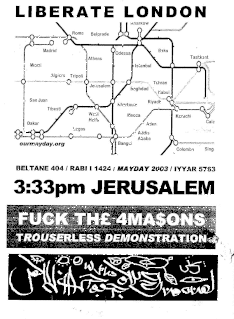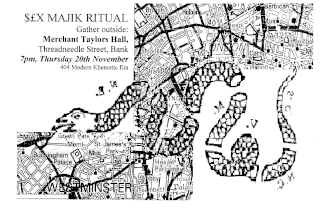
The London Psychogeographical Association (LPA), sometimes referred to as the London Psychogeographical Committee, is an organisation [1] devoted to psychogeography. The LPA is perhaps best understood in the context of psychogeographical praxis.

The London Psychogeographical Association (LPA), sometimes referred to as the London Psychogeographical Committee, is an organisation [1] devoted to psychogeography. The LPA is perhaps best understood in the context of psychogeographical praxis.
The LPA was first mentioned in 1957 by the British artist Ralph Rumney, as one of the organisers of the "First Exhibition of Psychogeography" in Brussels, which included his work. [2] According to many accounts the group eventually merged into the Situationist International. [3] Rumney was in fact the only member of the 'Association'.
In the 1990s, the LPA was reinvoked as the LPA East London Section by Fabian Tompsett, using the pseudonym Richard Essex, who published a series of newsletters and pamphlets under its name, as well as the writers grouped around the multiple user name Luther Blissett, including Stewart Home. Activities of the ELS also included trips to destinations of psychogeographical interest and the organisation of three sided football matches.
This version of the LPA has been described by the writer Iain Sinclair, whose work is often described as psychogeographical, as useful in "branding" that kind of practice. [4] [5]
In 1994 Barry Hugill wrote an article for The Observer covering the LPA. He depicted their ideas as "so cranky that to mention Mr Ackroyd's name in the same breath is to invite a writ." However he also states that "the psychogeographers fear that in 2000 there may be an attempt to perpetuate patriarchy through the ritual murder of a top member of royalty." [6]
The work of Luther Blissett, Stewart Home and other psychogeographical groups is said to involve the issuing of numerous leaflets and letters under a series of aliases, both personal and organisational, and the description of interactions, including collaborations and feuds, between both these and other, real people and groups (for example between Luther Blissett and the parapolitical researcher Larry O'Hara). [7]
The last LPA Newsletter was issued around the year 2000.
The Situationist International (SI) was an international organization of social revolutionaries made up of avant-garde artists, intellectuals, and political theorists. It was prominent in Europe from its formation in 1957 to its dissolution in 1972. The intellectual foundations of the Situationist International were derived primarily from libertarian Marxism and the avant-garde art movements of the early 20th century, particularly Dada and Surrealism. Overall, situationist theory represented an attempt to synthesize this diverse field of theoretical disciplines into a modern and comprehensive critique of mid-20th century advanced capitalism.
Ralph Rumney was an English artist, born in Newcastle Upon Tyne.
The Letterist International (LI) was a Paris-based collective of radical artists and cultural theorists between 1952 and 1957. It was created by Guy Debord and Gil J. Wolman rejoined by Jean-Louis Brau and Serge Berna as a schism from Isidore Isou's Lettrist group. The group went on to join others in forming the Situationist International, taking some key techniques and ideas with it.

Psychogeography is the exploration of urban environments that emphasizes interpersonal connections to places and arbitrary routes, and follows a loosely defined urban practice known as the dérive. It was developed by members of the Letterist International and Situationist International, which were revolutionary groups influenced by Marxist and anarchist theory as well as the attitudes and methods of Dadaists and Surrealists. In 1955, Guy Debord defined psychogeography as "the study of the precise laws and specific effects of the geographical environment, consciously organized or not, on the emotions and behavior of individuals." As a practice and theory, psychogeography has influenced a broad set of cultural actors, including artists, activists and academics.
Kevin Llewellyn Callan, better known as Stewart Home, is an English artist, filmmaker, writer, pamphleteer, art historian, and activist. He is best known for his novels such as the non-narrative 69 Things to Do with a Dead Princess (2002), his re-imagining of the 1960s in Tainted Love (2005), and earlier parodistic pulp fictions Pure Mania, Red London, No Pity, Cunt, and Defiant Pose that pastiche the work of 1970s British skinhead pulp novel writer Richard Allen and combine it with pornography, political agit-prop, and historical references to punk rock and avant-garde art.
Neoism is a parodistic -ism. It refers both to a specific subcultural network of artistic performance and media experimentalists, and, more generally, to a practical underground philosophy. It operates with collectively shared pseudonyms and identities, pranks, paradoxes, plagiarism and fakes, and has created multiple contradicting definitions of itself in order to defy categorization and historization.
Luther Loide Blissett is a former professional footballer and manager who played for the England national team during the 1980s. Born in Jamaica, Blissett played as a striker, and is best known for his time at Watford, whom he helped win promotion from the Fourth Division to the First Division. As of 2022, Blissett holds Watford's all-time records for appearances and goals, having played 503 games and scored 186 goals.

Luther Blissett is a multiple-use name, an "open pop star" informally adopted and shared by hundreds of artists and activists all over Europe and the Americas since 1994. The pseudonym first appeared in Bologna, Italy, in mid-1994, when a number of cultural activists began using it for staging a series of urban and media pranks and to experiment with new forms of authorship and identity. From Bologna the multiple-use name spread to other European cities, such as Rome and London, as well as countries such as Germany, Spain, and Slovenia. Sporadic appearances of Luther Blissett have been also noted in Canada, the United States, Finland, and Brazil.
Psy-Geo-Conflux is an annual New York City festival dedicated to psychogeography, where visual, performance and sound artists, writers, urban adventurers, researchers and the public gather for four days to explore the physical and psychological landscape of the city.

Iain Sinclair FRSL is a Welsh writer and filmmaker. Much of his work is rooted in London, most recently within the influences of psychogeography.

The dérive is a revolutionary strategy originally put forward in the "Theory of the Dérive" (1956) by Guy Debord, a member at the time of the Letterist International. Debord defines the dérive as "a mode of experimental behaviour linked to the conditions of urban society: a technique of rapid passage through varied ambiances." It is an unplanned journey through a landscape, usually urban, in which participants drop their everyday relations and "let themselves be drawn by the attractions of the terrain and the encounters they find there". Though solo dérives are possible, Debord indicates
that the most fruitful numerical arrangement consists of several small groups of two or three people who have reached the same level of awareness, since cross-checking these different groups' impressions makes it possible to arrive at more objective conclusions.

The Association of Autonomous Astronauts is a worldwide network of community-based groups dedicated to building their own spaceships. The AAA was founded 23 April 1995. Although many of their activities were reported as serious participation in conferences or protests against the militarization of space, some were also considered art pranks, media pranks, or elaborate spoof. The AAA had numerous local chapters which operated independently of one another, with the AAA effectively operating as a collective pseudonym along the lines of Luther Blissett.

Unpopular Books is a publisher in London's East End, producing leaflets, pamphlets, and books.
Michèle Bernstein is a French novelist and critic, most often remembered as a member of the Situationist International from its foundation in 1957 until 1967, and as the first wife of its most prominent member, Guy Debord.
The Workshop for Non-Linear Architecture (WNLA) was a group of experimental artists and psychogeographers. The group was active in parts of Great Britain and Glasgow during the 1990s. Based on the urban practices of the Paris-based Lettriste Internationale (1952–1957), the workshop focused on developing the Lettrist theory of Unitary Urbanism. The theory was developed through physical research and behavioral intervention.

Mémoires (Memories) is an artist's book made by the French social critic Guy Debord in collaboration with the Danish artist Asger Jorn. Its last page mentions that it was printed in 1959, however, it was printed in December 1958. This publication is the second of two collaborative books by Jorn and Debord whilst they were both members of the Situationist International.
Paul Terence Conneally is a poet, artist and musician based in Loughborough, UK.
The London Free School (LFS) was founded on 8 March 1966, principally by John "Hoppy" Hopkins and Rhaune Laslett.
The Seven By Nine Squares was an early internet site, and art project, led by Florian Cramer. It was designed as an interactive literary experience, and speaks primarily of the concepts of Neoism, collective identity, and Monty Cantsin.
Laura Oldfield Ford, also known as Laura Grace Ford, is a British artist and author. Her mixed media and multimedia work, encompassing psychogeography, poetry and prose, photography, ballpoint pen, acrylic paint and spray paint, explores political themes and focuses on British urban areas. Her zine Savage Messiah, which centres on London, was published from 2005 to 2009 and collected as a book in 2011.